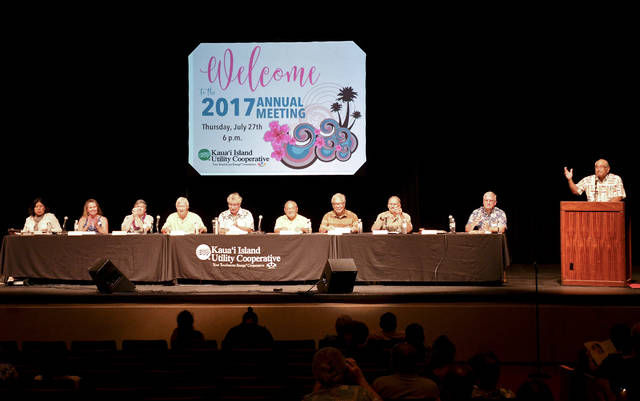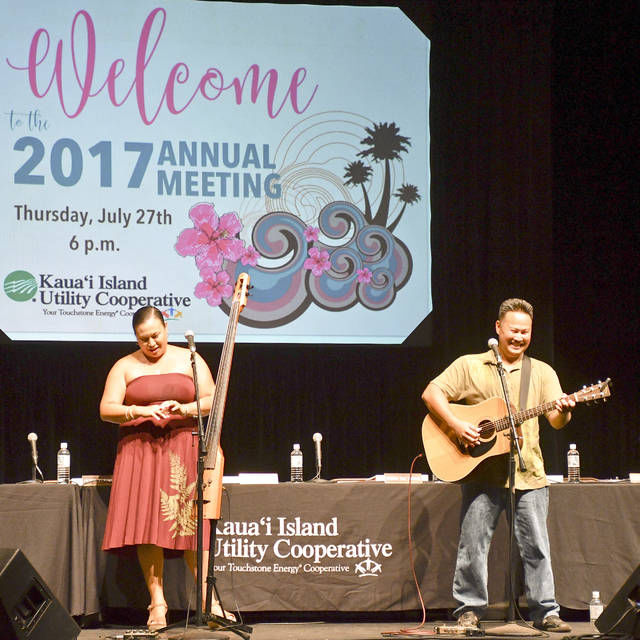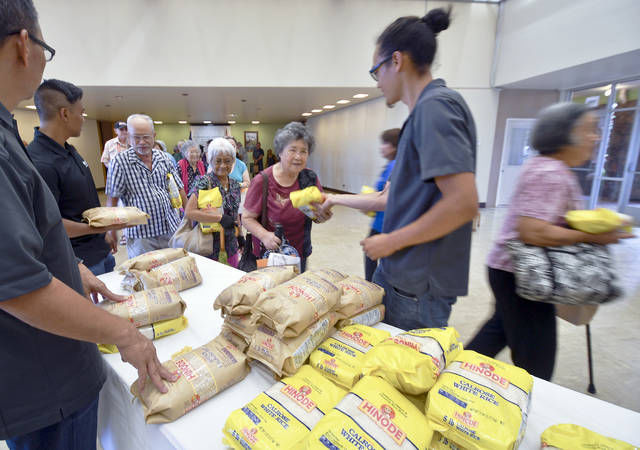LIHUE — For KIUC and its member-owners, 2016 was a year filled with milestones. That was the message delivered by board members and the cooperative’s management at the 15th KIUC annual meeting Thursday at War Memorial Convention Hall. “We were
LIHUE — For KIUC and its member-owners, 2016 was a year filled with milestones.
That was the message delivered by board members and the cooperative’s management at the 15th KIUC annual meeting Thursday at War Memorial Convention Hall.
“We were able to report that over the past nine years we’ve seen the amount of renewable generation triple, while our rates came down 18 percent,” said David Bissell, KIUC’s president and chief executive officer.
He added that their reliability rating of 99.9 percent in 2016 was the best its recorded since becoming a cooperative 15 years ago.
About 200 people attended the meeting, during which an update on cooperative activities was provided, followed by questions and answers and public testimony.
Members were provided chili and rice and had an opportunity to talk with board members and staff. Members also received a package of three Light Emitting Diode lamps and a reusable shopping bag.
Highlights from the presentation include:
w Renewable progress: In early 2016 the Green Energy Team biomass plant became operational, and now provides nearly 9 percent of Kauai’s power around the clock. KIUC also experienced the full impact of its various solar inputs, and routinely reached more than 90 percent renewable penetration during daylight hours on sunny days throughout the year. By year’s end, KIUC’s renewable portfolio had grown to 36 percent, up from 9 percent in 2008. In the process, the cooperative reduced its diesel consumption by 10 million gallons per year.
w Rate stability: Between 2008 and 2016 KIUC rates decreased 18 percent, which includes a reduction over the past 12 months. The shift to renewables promises to have a long-term downward pressure on rates, as 20- and 25-year power purchase agreements (PPA) at favorable rates replace the fluctuating price of diesel.
w Record reliability: In 2016, KIUC posted its most favorable reliability rate to date: 99.98 percent. That means that the average member experienced roughly 1.04 hours of outage for the entire year. It was noted during the meeting that the batteries associated with our solar facilities have helped stabilize and buffer the grid against outages.
w Member service enhancements: KIUC’s SmartHub service continues to grow in popularity, giving members the ability to check usage, pay bills, report service issues and receiving notifications online. Since its launch in late 2015, 3,500 members have signed up for SmartHub.
w Path to 70 percent renewable: In January, the board set a goal of reaching 70 percent renewable by the year 2030. The following projects are expected to bring KIUC to that goal:
w Tesla (Kapaia): This solar-plus-battery storage project is the first utility-scale dispatchable solar facility in the world. Opened in March, Tesla now delivers 13 megawatts of power for four hours during evening peak. KIUC has a 20-year PPA with Tesla to purchase power at 13.9 cents per kWh, which is lower than the current cost of diesel.
w AES Distributed Energy, Inc. (Lawai): Following the Tesla agreement, KIUC secured a 25-year PPA with AES for an even larger dispatchable solar project on the southside. If approved by the Hawaii Public Utilities Commission and other regulatory agencies, the AES facility will dispatch 20 megawatts for five hours during evening peak, for an even lower price of 11 cents per kWh. A third dispatchable solar project is also being discussed with AES.
w Puu Opae pumped storage hydro (Waimea): A landmark mediation agreement that was reached in April between KIUC and four other parties has laid the groundwork for development of a facility that could provide a full 20 percent of island energy needs. The agreement sets stream flow standards for the Waimea River, and allows diversion of water within limits for the renewable energy project, agricultural irrigation, and uses that conform with long-range plans on property owned by the Department of Hawaiian Homelands. Aside from renewable power, the project will provide valuable infrastructure for DHHL and allow it to open up more of its lands on the Westside.
“We appreciate our members coming out to the annual meeting, giving us a chance to have a productive dialogue,” stated board Chair Allan Smith.
It was also announced there will be no patronage capital refunds or rebates this year.
“How patronage capital works is that, if at the end of the year, we have a surplus of funds either because the cooperative was successful at keeping costs low, or we had more sales than anticipated, the surplus is returned to members as patronage capital,” said Beth Tokioka, KIUC spokeswoman. “If we budget well, and have little or no money remaining at the end of the year, we don’t return anything. This is a year-to-year thing. We will determine whether patronage capital is returned next year after we close the books.”
Marge Dente, in a public testimony, said rate structure changes are coming based on the utility’s encouragement to use power during the daylight hours, and night usage rates being charged at a higher rate. She implored KIUC board members not to penalize those who do not want smart meters, and asked for more women board members.




